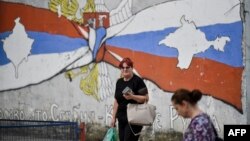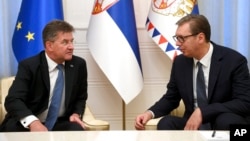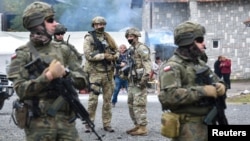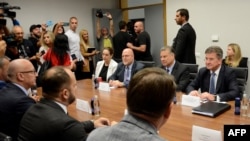An agreement between Serbia and Kosovo, mediated over the weekend by the European Union and the U.S., settled a dispute over identity documents, but tensions over the matter, as well as license plates for ethnic Serbs in the north of Kosovo, are a reminder of the fragile stability in the region.
Citizens can now move freely between the countries with their national ID cards. Until now, Kosovo citizens were given temporary Serbian documents when traveling to Serbia. In the latest deal, Kosovo agreed not to introduce entry/exit documents for Serbian ID holders.
The European Union's foreign policy chief, Josep Borrell, hailed the agreement.
"This is a European solution. We congratulate both leaders on this decision & their leadership," he said on Twitter.
"The United States supports this agreement and sees it as an important step forward towards normalized relations, centered on mutual recognition," a State Department spokesperson told VOA on Monday.
But analysts say it is precisely Serbia’s refusal to recognize the sovereignty of its former province that lies at the crux of the problems between the countries.
David Kanin, adjunct professor of international relations at Johns Hopkins University and a former CIA senior analyst, told VOA, "There's only one problem between Serbia and Kosovo, and that is the status of Kosovo." He said that problems such as ID cards and license plates are "simply part of that issue."
Frank Wisner, a retired U.S. ambassador who served as the U.S. special envoy to U.N.-backed talks between the countries, told VOA that the U.S. is steadfast in its support for Kosovo's independence from Serbia, which it declared in 2008.
"The United States has been foursquare behind Kosovo in consolidating that independence and achieving the widest possible recognition, but most particularly recognition by Serbia. That has not happened," he said, adding that it is not likely to happen soon.
Kosovo sees the latest agreement as one step on the road to mutual recognition, with Prime Minister Albin Kurti saying full reciprocity on other issues will be imposed, if an agreement to that end is not reached.
"We want there to be normalization to be achieved through an internationally and legally binding agreement for the complete normalization of relations with mutual recognition at the center," he said one day after the deal on ID cards was achieved.
But Serbian President Aleksandar Vucic said that allowing border crossing with Kosovo ID cards is done for practical reasons and "cannot be interpreted as recognition of Kosovo's independence."
The European Union is leading the dialogue between the countries. Five of its own members do not recognize Kosovo, and Kanin says that that puts Serbia in a comfortable position.
"On the Kosovo side, on the other hand, they can't do anything to force through their sovereignty because the context in which they are operating prevents their sovereignty from being universally recognized, because that context includes five members of the EU who do not recognize Kosovo as a country," he said.
The European Union has told both countries their EU aspirations hinge on normalizing relations.
Roadblocks in Kosovo
The latest round of high-level diplomacy followed tensions in late July in a part of northern Kosovo where ethnic Serbs are in the majority, after Kosovo's government announced it would begin requiring Serbian document holders entering Kosovo to obtain temporary Kosovo-issued IDs, just as Kosovo citizens entering Serbia have had to do for over a decade.
Kosovo also said it would begin requiring ethnic Serbs living in Kosovo to use Kosovo license plates for their cars, instead of Serbian ones. Some local Serbs responded by blocking roads, prompting NATO to warn against escalation.
"Should stability be jeopardized KFOR stands ready to intervene and will take any measures that are necessary to ensure a safe and secure environment and freedom of movement for all the people of Kosovo," NATO Secretary-General Jens Stoltenberg said, referring to the 3,770-troop peacekeeping force in Kosovo.
Roads were opened after Kurti agreed to postpone implementation of the plan for ID cards and license plates until September 1, but the flare-up was a reminder that security is fragile in a region where old disagreements are not settled and memories of the 1998-99 Kosovo war remain fresh. Kosovo still plans to implement the license plate requirement on September 1.
Between EU and Moscow
Since the July flare-up, Moscow has repeatedly expressed its support for Serbia. The countries have historical ties. Serbia – like Kosovo and other Western Balkans countries – aspires to become an EU member, but unlike them it has not imposed sanctions on Russia.
Last week its minister of interior, Alexandar Vulin, met in Moscow with Russian Foreign Minister Sergey Lavrov. Referring to Western sanctions, Vulin said Belgrade "will never engage in anti-Russian hysteria."
“Serbia is the only state in Europe that didn’t introduce sanctions and was not part of the anti-Russian hysteria,” he told Lavrov.
Serbia, however, has joined the U.N. resolution condemning Russia's invasion. In a Reuters interview on Monday, Vucic said that his country is the stage for a proxy war between East and West.
"You have a proxy war of big powers going on in Serbia through political players, the nongovernmental sector on both sides, the media and various social organizations, and you can see it every day, in every way," he said, speaking to Reuters at his office in Belgrade.
Kanin says Vucic is comfortable sitting on two stools.
"Serbia is not going along with Western policy in total," he said. "They've gone along with certain things, [such as] the U.N. vote. There have been certain areas in which Vucic has leaned toward the Western stool. In certain situations, he leans toward the Russian stool."
Next steps
There is no agreement yet on the license plates for local Serbs in Kosovo's North, and on Wednesday, Serbia's Vucic said he does not believe that a solution is possible.
"From September 1, [Kosovo] will ... try to force Serbs to change car plates, and I don't think they will have a big success" Vucic told reporters.
However, Major General Ferenc Kajari, the commander of NATO's peacekeeping mission in Kosovo, sought to dispel fears about a conflict. "We are monitoring the situation ... and we don’t see even an indication of any preparation for a war," he told Reuters.
The U.S. envoy for the Western Balkans, Gabriel Escobar, has called on the parties to continue the dialogue and to implement all the agreements that they have agreed on, including one on a Community of Serb Municipalities in the North of Kosovo. Kurti is against such a monoethnic body with executive powers within the country.
Whether one believes that incremental progress will ultimately yield mutual recognition or that agreements on practical matters are beneficial for their own sake, Kosovo and Serbia are bound to face their disagreements.
Wisner said full resolution is the ultimate goal, "but you can only get there step by step."
“It also falls to the two governments in Belgrade and Pristina to find steps short of a full resolution that will bring good sense to the region and allow practical solutions to practical problems and give time a chance to make a difference on the overall question of recognition.”
Besim Abazi and Milan Nesic contributed to this report. Some information came from Reuters and The Associated Press.







